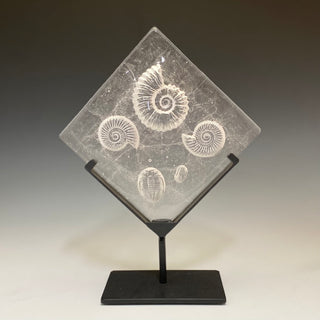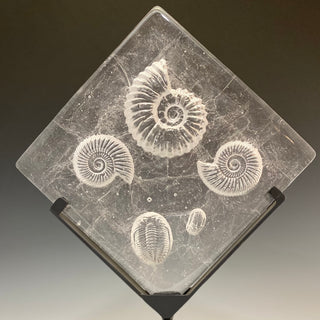Description
7.5"h x 7.5"w
cast glass on a steel base
Sinkus’ Ammonite sculptures are the connecting bridge between his marine and geologic works. For over 350 million years, ammonites populated our ancient oceans just as the squid, crustaceans, and fish featured elsewhere in the exhibition do today. The alchemy of time has changed them. Today’s ammonites are fossils - stone forms, easily overlooked. In this way, the Ammonite sculptures provide a through line, contextualizing the relationship between sea creatures and stone as not only ‘buried’ things, but consecutive steps in an eons-long process.
In Fossil Panel, the ammonite is accompanied by another ghostly denizen of the earth's ancient oceans. Near the base of the panel appear two trilobites. For millions of years, these two species shared space in our oceans, and remain paired for eternity, often found fossilized side by side.
This work is included in the exhibition Beneath There is Light, on view at The Glass Station Gallery from June 6-19
Description
7.5"h x 7.5"w
cast glass on a steel base
Sinkus’ Ammonite sculptures are the connecting bridge between his marine and geologic works. For over 350 million years, ammonites populated our ancient oceans just as the squid, crustaceans, and fish featured elsewhere in the exhibition do today. The alchemy of time has changed them. Today’s ammonites are fossils - stone forms, easily overlooked. In this way, the Ammonite sculptures provide a through line, contextualizing the relationship between sea creatures and stone as not only ‘buried’ things, but consecutive steps in an eons-long process.
In Fossil Panel, the ammonite is accompanied by another ghostly denizen of the earth's ancient oceans. Near the base of the panel appear two trilobites. For millions of years, these two species shared space in our oceans, and remain paired for eternity, often found fossilized side by side.
This work is included in the exhibition Beneath There is Light, on view at The Glass Station Gallery from June 6-19




